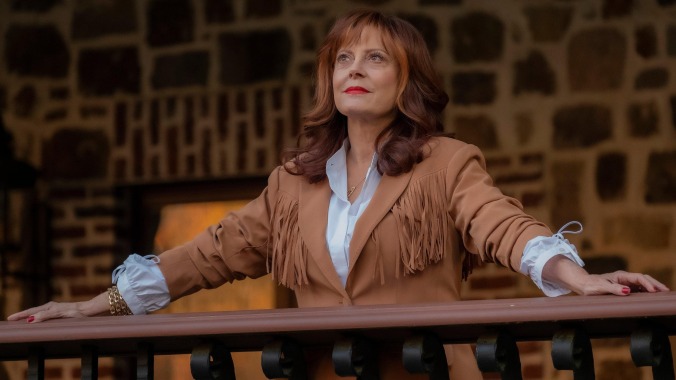Monarch is a little bit country-music drama, a little bit murder mystery
Fox's soapy series, starring Susan Sarandon and Trace Adkins as heads of a famous Texas music family, would love to build an Empire

At first glance, Monarch, the long-awaited Fox drama about the fictional first family of country music, can be described as an ambitious amalgamation of Empire, Dynasty, and Nashville—with, sure, a hint of Succession. Created by newcomer Melissa London Hilfers, the Texas-set musical-drama has all the makings of a hit: a sudsy premise, a star-studded cast, and a silky soundtrack composed of original tunes and country classics.
But for all its soapy seductions and scheming songbirds, Monarch’s reluctance to examine the overwhelmingly white fabric of the country music scene undermines its examination of the cutthroat nature of the music industry. The show, instead, turns into a familiar family drama, relying on plot twists that any regular viewer of the genre can see coming from a mile away.
The story picks up at a press conference for Dottie Cantrell Roman (Susan Sarandon) and Albie Roman (Trace Adkins), the queen and king of country music, who are set to be honored with the “Lifetime Achievement Award” at the CMAs. (Each episode is bookended with a murder mystery set three months after the pilot, which implicates all of the Romans and heightens the stakes for the family empire.)
Dottie, however, has been harboring a secret from their legions of fans and starts preparing her eldest daughter, Nicky (Anna Friel), to be her heiress apparent. This doesn’t sit right with her youngest daughter, Gigi (Beth Ditto), a married lesbian who has always felt like an outcast and shied away from the spotlight—until now. At the center of this sisterly rivalry is middle child Luke (Joshua Sasse), the charismatic CEO of Monarch Entertainment—or, as guest star Shania Twain puts it, the “adorable, green-eyed stud” of the Romans—who is desperate for his father’s approval. (The show is set in an alternate universe where country music hits, such as Twain’s “Man! I Feel Like A Woman!” and Garth Brooks’ “Friends In Low Places,” actually belong to the Romans.)
Seeing her succession as an opportunity to make a name for herself as a solo act, Nicky, who has spent her entire life living in Dottie’s shadow, soon discovers that her family’s success was built on a foundation of lies. In fact, the show’s audience will soon unravel a lie of their own: Friel, not Sarandon, is the show’s real leading lady—and a pretty great one at that. Sarandon appears largely in flashbacks that are meant to give additional context to Dottie’s complicated relationships with her husband and children. But these vignettes have sadly been few and far between in the six episodes screened for review and make the show, like the rest of the Roman family, feel lost without her.
Friel, to her credit, does much of the heavy lifting in the first half of the season, allowing viewers to understand the extreme pressure Nicky feels to keep a single crack from showing in her mother’s legacy. She belts out song after song, delivers memorable, fast-paced one-liners in a Texas accent (“I was going to say be careful about the rats, but there’s no need because … you’re going to fit right in”), and plays Nicky with such steadfast conviction that it’s easy to wonder why she hasn’t been more successful on this side of the pond since starring in ABC’s Pushing Daisies. No matter, this is, thankfully, a role that is worthy of her talents.
Ditto’s Gigi is a fantastic foil to Friel’s Nicky, playing a thirtysomething newbie who must undergo a steep learning curve about the business, even if those lessons occasionally come at the hands of her own sister. In the pilot, Dottie says she might not have been mother of the year, but she did teach her children to look out for each other—and it is precisely those sibling dynamics that help to ground the show when the storylines spiral out of control.
A multi-platinum and Grammy-nominated recording artist, Adkins is unsurprisingly strongest when he’s singing and playing a guitar. But family dramas are almost always more compelling when there’s a parent who is the glue that holds them all together—and Adkins is not the right man for that job. He shares an uneven chemistry with Sarandon, at best, making it hard to believe that their characters have been married for more than 40 years. It is not entirely clear if Albie’s inability or hesitancy to express affection for his children stems from his own disposition, or the fact that Adkins is simply out of his depth as an actor.
Unlike other primetime family dramas about the One Percent, the Roman family’s wealth and privilege isn’t necessarily reflected in the cars they drive or the clothes they wear. It’s more seen in how insulated they feel from the rest of the world. When Catt Phoenix (Martha Higareda)—who has a vendetta against the fam—arrives in Austin, she is hellbent on helping her teenage daughter, Ana (Emma Milani), sign with Monarch. But they largely avoid talking about the socioeconomic gap that exists between them and the Romans, even when Ana catches the eye of Nicky’s adopted son, Ace (Iñigo Pascual).
In fact, Monarch shies away from any mention of race or Texas politics altogether, making it seem like the show is trying to appeal to both sides of the aisle. But in doing so, the characters from marginalized communities don’t feel fully formed. Take Gigi’s music-managing wife, Kayla (Meagan Holder), for instance, who is reduced to simply a spouse with a damaging secret in the eps we saw. Those characters almost feel like window dressing for Monarch to seem more progressive without pushing any real buttons, making this musical drama, at least so far, feel more like a one-hit wonder than a real superstar in the making.